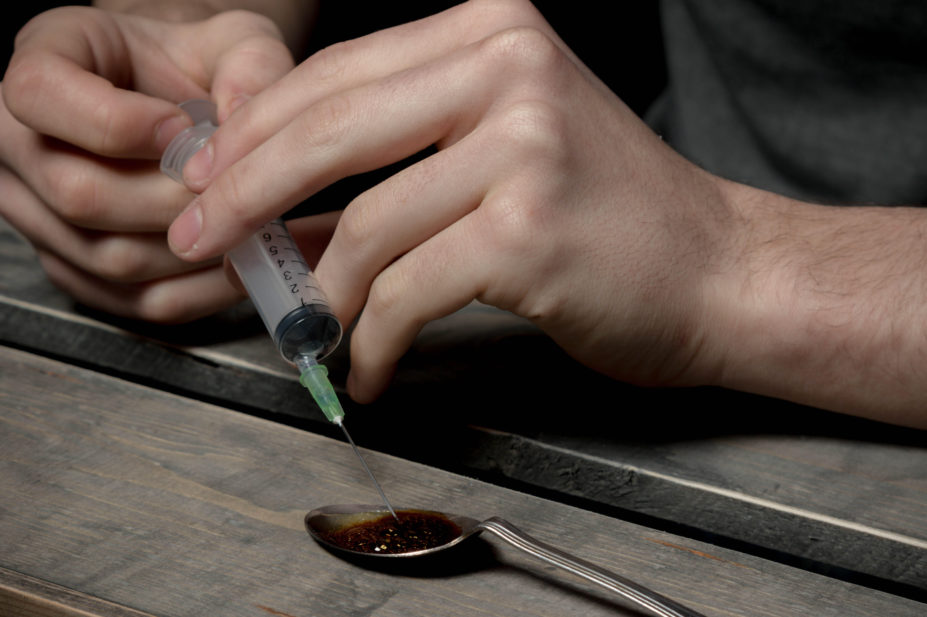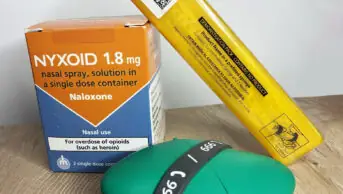
Ben Gingell / Alamy Stock Photo
Pharmacists across the UK could be allowed to supply and administer naloxone under new plans proposed by the Department of Health and Social Care (DHSC).
In a consultation, launched on 4 August 2021, the DHSC proposed amending current regulations to allow naloxone to be supplied and administered by a wider group of professionals, including pharmacists, who come into regular contact with drug users.
Naloxone is a treatment that can reverse the effects of an opioid overdose and prevent drug-related deaths.
In July 2020, the government launched the ‘Joint combating drugs unit’ and has now committed to publishing an ambitious new drug strategy later in 2021 to tackle drug misuse across UK society.
The commitment was made in response to Dame Carol Black’s independent review on drugs.
The government’s consultation comes on the same day that a report from the Office for National Statistics (ONS) revealed that the number of deaths related to drug poisoning in England and Wales has reached record levels.
In 2020, 4,561 deaths related to drug poisoning were registered in England and Wales. This is 3.8% higher than the number of deaths registered in 2019 (4,393 deaths).
The ONS report, published on 3 August 2021, noted that this is the highest number of drug-related deaths in England and Wales since records began in 1993 and 61% higher than the number registered a decade earlier.
Scotland, which records this data separately, also logged a record number of drug-related deaths in 2020 — representing a 5% increase on 2019.
Community pharmacies in Scotland are currently able to distribute naloxone kits, with 89,543 supplied as of 31 December 2020.
Of the deaths classified as relating to drug poisoning in England and Wales, 2,996 were related to drug misuse, which is defined as drug poisoning where the underlying cause is drug abuse or drug dependence, and involves any of the controlled substances under the Misuse of Drugs Act 1971. This number is an increase from 2,883 drug misuse deaths in 2019.
The North East of England had the highest rate of drug misuse deaths at 104.6 deaths per million people, while London had the lowest rate at 33.1 deaths per million.
The report said the “overall trend is driven primarily by deaths involving opiates, but also by an increase in deaths involving other substances like cocaine”.
“Across Europe, rates of deaths involving heroin or morphine have been increasing, while the number of new heroin and morphine users has fallen.
“This indicates higher rates of death among existing long-term drug users,” the report said, adding that possible explanations include an “ageing cohort of drug users, likely to be suffering from the effects of long-term drug use” as well as new trends, such as taking gabapentinoids and benzodiazepines alongside heroin or morphine, which may increase the risk of an overdose.
The report also lists a “disengagement or non-compliance with opiate substitute therapy” as a possible explanation.
Roz Gittins, director of pharmacy at health and social care charity Humankind, said the ONS report “highlights the importance of promptly implementing the recommendations from the recently published part two of the Dame Carol Black review”.
“In particular, the importance of the need for proper funding, following the previous years of disinvestment in treatment services.”
Claire Anderson, president of the Royal Pharmaceutical Society, said: “It is sad to see a rise in the amount of drug-related deaths in England and Wales, and it is important to recognise the role pharmacists can play in preventing drug misuse, as well as drug-related deaths.
“We are pleased to see the Scottish government has recognised the importance of ensuring adequate funding is available to tackle the rising drug-related deaths since 2019, and RPS would welcome equivalent levels of funding and commitment in England and Wales.”
The consultation on allowing pharmacists to supply naloxone will run for eight weeks.
READ MORE: Catriona Matheson: ‘I support decriminalisation of illegal drugs for personal use’


